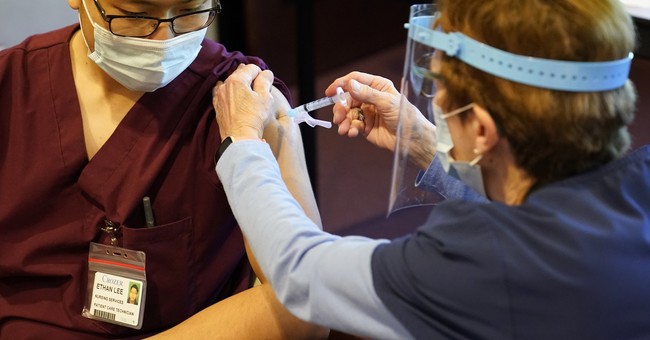By RICK MORAN
The data is very preliminary but it appears that severe side effects are occurring far more often in the Pfizer COVID vaccine than happen after patients are given a flu shot. The CDC says that its safety monitoring detected 21 cases of anaphylaxis, a severe allergic reaction, after receiving the Pfizer-BioNTech COVID-19 vaccine. There were eight allergic reactions to the Moderna vaccine. The CDC said the information was from almost 1.9 million vaccinations and covered the period from December 14-23.
That works out to 11.1 severe reactions for every million vaccinations, compared to 1.3 reactions for every million flu vaccinations.
The CDC assured the public that the rate of severe reactions was still considered “rare.”
“We all would hope that any vaccine would have zero adverse events, but even at 11 cases per million doses administered – it’s a very safe vaccine,” she said.
In 86% of the cases, symptoms began within 30 minutes of vaccination, and 81% of them occurred in people with a history of allergies or allergic reactions, including anaphylaxis events. Most of the patients who reported having this severe allergic reaction – 90% – were women.
Up to 20 percent of people who are vaccinated experience mild side effects including redness around the injection site, low-grade fevers, chills, and headaches. The CDC is advising those who are allergic to drugs or food not get the Pfizer vaccine.
Anaphylaxis is a serious, life-threatening allergic reaction and requires immediate medical attention, according to the American Academy of Allergy Asthma & Immunology. Symptoms can include skin rash, nausea, vomiting, difficulty breathing and shock. The most common anaphylactic reactions are to foods, insect stings, medication and latex.
The CDC said it will continue to monitor for adverse events, including anaphylaxis, and will regularly assess the benefits and risks of vaccination. However, the COVID-19 vaccine continues to be “an important tool in efforts to control the pandemic.”
The CDC says that as of Wednesday, 4.8 million people have received a COVID shot. There have been no reports of any deaths associated with either vaccine.
Statistics so far would indicate that if you’re allergic to anything, wait before getting the COVID vaccine. That is the CDC’s recommendation but the reason for waiting — especially if you’re at low risk of severe illness — is that later versions of these vaccines may be far less toxic to some people’s immune systems. The anaphylaxis reaction is due to the body’s immune system kicking into overdrive. Future vaccines may not affect people with such sensitivities.
That rate of severe reactions is likely to plummet once the vaccine is more widely distributed. Even now, it’s still a good bet if you’re highly susceptible to getting gravely ill from COVID.





